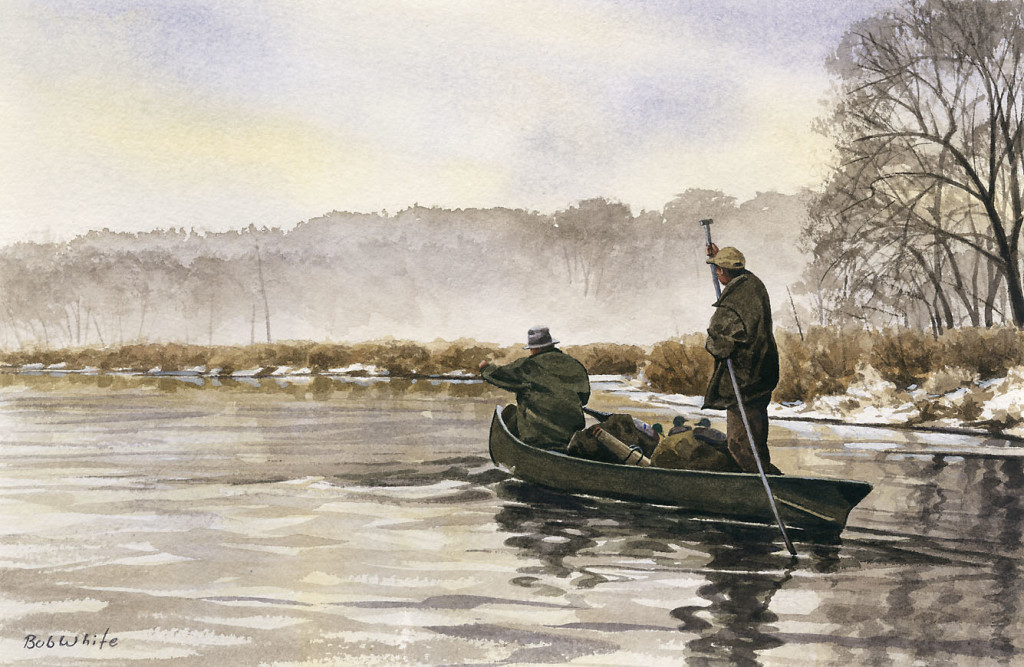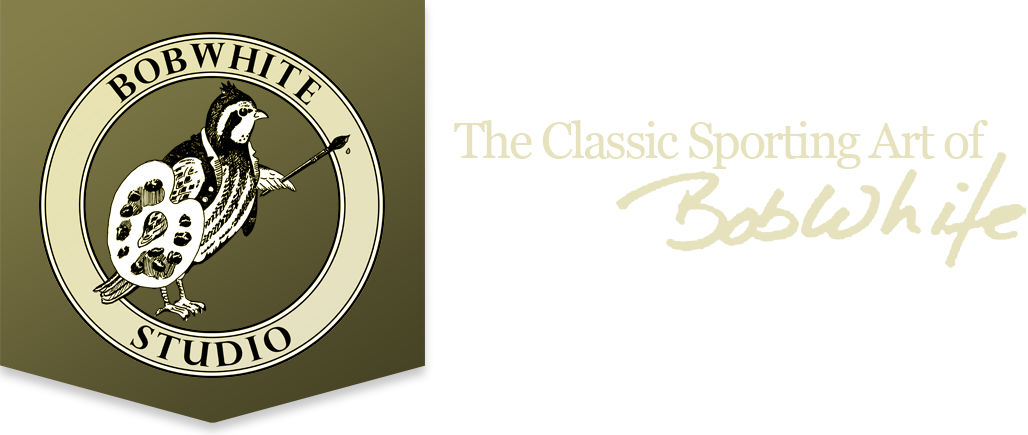
Thanksgiving is a ritual that celebrates our outdoor tradition. To our forefathers, it was an expression of gratitude for the harvests, both cultivated and wild, that provided sustenance over the long winter months. It’s become a custom for my neighbor and I to hunt together on Thanksgiving morning, both to honor this tradition, and to (hopefully) provide enough mallards for a Christmas dinner.
It’s great to have a duck-hunting partner that lives next door. If one of us oversleeps, a snowball to the other’s bedroom window usually gets the lights turned on in a hurry. If the other has run a little behind, it’s an easy matter to pitch in and help speed things along. Most importantly, when we forget something, we don’t have to run far to fetch it.
It’s also very convenient that we hunt the marsh just down the river from our little village. It allows us to hunt on Thanksgiving morning, and be home early enough to meet our familial obligations, which keeps our wives happy.
It’s no accident that waterfowl hunting runs through my neighbor’s veins. He grew up in Northern Wisconsin, the son of a duck hunter, and was named for his father’s gunning partner, Gordon MacQuarrie, whose cabin was just down the lake.
“Morning,” Gordy said in a hushed voice, as we met in the predawn darkness to load our gear. “Ready?”
“Morning,” I replied. I took one end of the canoe, and he the other. “A northwest wind. It looks like a great day to be out.”
The short ride on the down river road to the Boy Scout Camp, where we launch, was made in silence. The canoe was floated, the decoys and other gear balanced, and we pushed out into the dark currents with a minimum of conversation. We enjoy the early morning quiet far too much to clutter it with meaningless small talk. We glided through the inky darkness, out on the main river for half a mile before Gordy guided us into a small channel, which would eventually open up into an expansive marsh.
“The wind’s picked up,” Gordy said from the back of the canoe. “It’ll swing around out of the south east by dawn.”
“That wind’s perfect for the inside corner,” I replied over gusts that moaned in the trees. “The corner’s close, too. What time do you have to be back?”
The low scudding clouds had begun to break apart and the temperature dropped with every patch of stars that appeared. The cold began to bite.
“We’ll have the wind at our back going home. We should pick up at nine and leave by nine-thirty.”
“That works for me,” I said. “We need to be at the family farm by noon.”
There’s a joyful efficiency that happens when hunting partners know each other well. The canoe was emptied and Gordy threw one sack of decoys over his shoulder and dragged a second behind him through the shallow water while I pulled the canoe up into the tall grass and hid it. I could hear decoys hit the water in the dark as I carried our gun cases and shell bags to the blind and was going back for the last two bags of decoys as he joined me. “I’ve got the pocket set up on my side of the blind,” he said. “But, they’ll have to pass by you to get to it.”
“Great.”
“I’ll take one sack and string them out toward the big water. You take the other and fill in the flooded grass behind the blind.”
“Geese?”
“Let’s set out a few on the sand bar… you never know.”
We huddled into our hide a few minutes later, and contentedly listened to the wind, and the calling of ducks. A drake hailed nasally from behind us in response to a hen somewhere to our front. Two more birds called from our right. The first snowflakes of a short-lived squall blew past us and we heard a high and distant flock of geese calling frantically in the dark. We heard, but couldn’t see birds in the air, and there were splashes in the decoys behind the blind. “Happy Thanksgiving,” Gordy offered.
It was just light enough to see his smile. “Why, thank you,” I said. “Same to you.”
The wind continued to build but the snow stopped just as it became light enough to shoot. “Your side!” Gordy hissed over the wind. “High and right.”
A single bird dropped from the sky and quartered into the wind with deceptive speed. It towered as I rose, but the howling wind stopped its forward momentum and it rocketed straight up. It was an easy shot, the kind I sometimes make, and at the gun’s report, four drakes leapt out of the shallow flooded grass behind us. They struggled in the storm to fly clear of the blind, but drifted over Gordy’s left shoulder. His gun came up as he rose to meet them, and a pair of drakes crumpled, carried by the wind past the farthest decoys. All three birds quickly drifted away, toward the far side of the marsh. “I’ve got them,” I said, careful to step around what was left of the standing, late season grass that hid us. “I’ll be right back.”
I’d finally reached the last bird and turned to make my way back to the blind, when the clouds ripped completely apart and the eastern sky illuminated the marsh in a blinding light. “This is perfect,” I said to Gordy as I handed him two drakes. “The wind and sun are both behind us; the birds have to come into the wind to set up, and they can’t see anything when they do.”
Northern birds, which had traveled all night ahead of the storm now found the wind in their face and desperately sought refuge. We both shot well, and were only one bird shy of our limits, when Gordy got a very serious look on his face. “I didn’t bring my watch,” he said in a panic. “What time is it?”
“Almost nine o’clock,” I answered. “When do you have to be back?”
“Ten-thirty,” he said. “We need to start picking up at nine.”
“If we cut across the big bay and portage to the main channel, we can cut fifteen minutes off of our time,” I said conspiratorially. “If we hurry on the way home, we can hunt until nine-thirty.”
“If we hurry.”
“Right.”
As the sun rose in the sky, the glare on the water was lessened, and the birds became more wary. “What time is it?” Gordy asked.
“Nine-twenty.”
“Ten more minutes?”
“Right.”
“It’s time,” Gordy said twenty minutes later. “We’d better pick up.”
“Five more minutes?” I pleaded. “Hell, we’ve never shot a limit together.”
“But, we’ll have to really hurry on the way home.”
“Right.”
“Time to go,” he said fifteen minutes later.
“Five more?”
“Yeah.”
“They’ll kill us.”
“Yeah.”
“We’d better pack it up.”
“Yeah, ok,” he said. “But, you know what’ll happen? As soon as we get out in the decoys birds will start to work us.”
“Yeah, you’re right,” I answered. We better unload our guns, just to make sure that we can’t change our minds.”
“Right.” Gordy said, watching me unload my automatic. “This is a bad idea.”
“I know,” I said, and slipped the shells into my coat pocket, where I could get to them in a hurry. I didn’t case my gun. Neither did he.
We walked out into the decoys and circled back-to-back with our eyes skyward. “There they are!” Gordy hissed.
“Where?”
“Straight up!”
We dove back into the blind and fumbled for shells to stuff in our shotguns. Our eyes never left the sky and the seven big, northern birds that glided toward us. “We can only shoot one,” Gordy whispered.
“Yeah.”
They wanted in, but had seen our movement, and side-slipped over the pocket cross-wind to not lose any speed until they were sure. As they came into range, I rose, shouldered my gun, and snapped off the safety without conscious thought. I swung ahead of a beautiful, red-legged drake, and slowly began to squeeze the trigger when Gordy crushed it with a brilliant shot.
“Yeahhh!” He yelled.
“Helluva shot,” I replied. “We better scoot if we want to be married tomorrow.”
“You mean tonight.”
“Right. Lets go,” I said as I cased my shotgun and went for the canoe.
We picked the decoys up on the run, cut across the bay, and portaged everything through the woods in two trips. We hit the main river and paddled like two middle-aged participants of a “Survivor” episode, and laughed the whole way back to the landing. Guns, gear, decoys, and a heavy strap of ducks were carried up the long hill in record time and tossed into the back of the truck. Every Boy Scout in camp wondered what the hell was going on as we sped away. Five minutes later, we turned into my driveway, only an hour or so behind schedule.
“Hell,” I said as we rolled to a stop. “Neither of our wives really expected us to be home on time anyway.”
“Yeah,” Gordy said hopefully.
“How’d you two little boys do out there this morning?” Lisa said as she appeared at the truck window from out of nowhere and scared us to death.
“Check it out.” I said.
We walked around to the back of the truck, and it took the two of us to lift the bird strap clear.
“Yeah!” Lisa yelled. “You two unload everything, and I’ll go get the camera.”
The decoys and gear came out quickly. At the bottom of the pile were the two gun cases, and as I reached for mine the hair on the back of my neck stood on end. I relived those last few moments in the marsh in slow motion, and knew without having to look, what I’d find when I opened the case.
When I finally did, it revealed what I already knew. My face went ashen and my legs trembled. The gun was still loaded and the safety was off.
“Let’s get a picture of the two great white hunters with limits of green heads!” Lisa said cheerfully. “Hey, Bob… you all right?”
I’ll be right back,” I mumbled, and sped off to the garage. Once inside and out of sight, I unloaded the gun and my fingers trembled as I placed it on “safe”. I was physically sick with the realization that I had almost killed my friend and destroyed two families.
“Is everything ok?” Lisa asked, as she walked over to me in the garage.
“Hug me.” I whispered.
Somehow, I managed to smile for the camera while of our families cheered. When I look at that image today, I see a happy man struggling with his partner to lift two limits of mallards… and me. Only the eyes are different; in my partner’s eyes there is joy, in my soul there is abject horror.
That photograph is tacked up in a very prominent place, on the bulletin board in the back entryway, where I’m sure to see it every day. I keep it there as a reminder to myself of just how lucky I am. And, to remind me that no one is ever too experienced to not pay attention. I look at it for an especially long time on those mornings before I head out into the marsh.
There was never a Thanksgiving with more to be thankful for.





